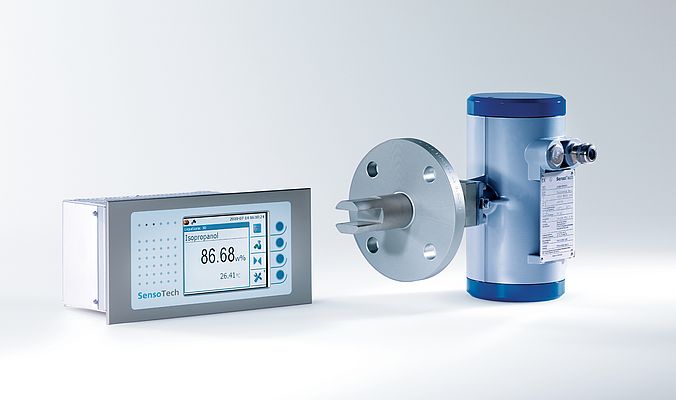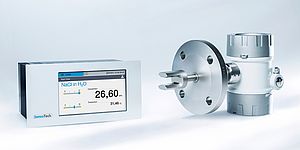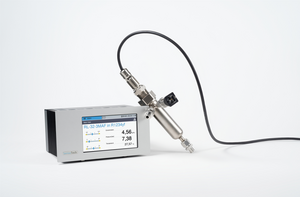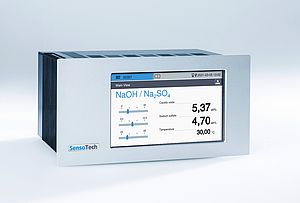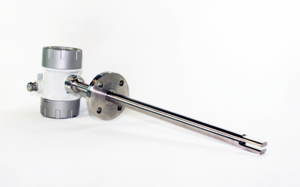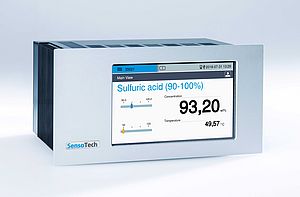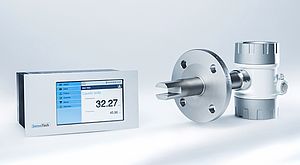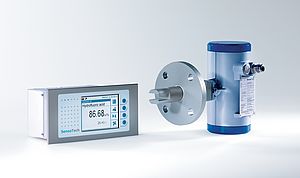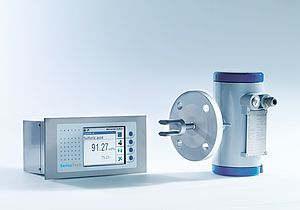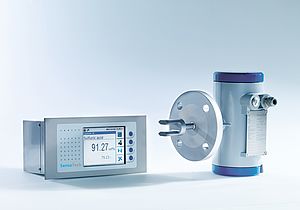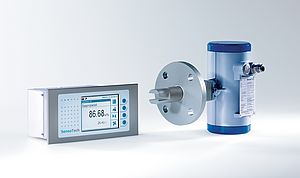In numerous industrial manufacturing processes, the inline measurement of concentrations is required to monitor the product quality and to produce efficiently in terms of resources. Sonic velocity is recommended as a measuring method, because it provides highly precise and actual measuring values within seconds. Furthermore, the measuring systems can be installed without a bypass and are used in almost all chemical substances.
The LiquiSonic measuring system produced by SensoTech is based on the above mentioned method and has proved to be reliable for over 20 years in numerous industrial and laboratory applications. Whether installed directly in the pipeline or in a vessel, the measuring system measures reliably the concentrations of process liquids. The system is the most suited, not only due to its robust and maintenance-free construction and its easy handling, but also for use in specific processes with different materials and designs. Thus, there are lots of possibilities, for example, corrosion resistant sensor coatings, installation lengths up to 3 m or diverse process fittings like DIN, Varivent, Clamp or ANSI. These sensors are also available with an ATEX and IECEx approval for using them in hazardous areas. Beside the sensors, the controller is also included in the system. This controller manages and visualizes the measuring data transferred over common interfaces to control systems.
The measuring system is used in the chemical and pharmaceutical industry, the beverage production, steel and automobile industry and many further industries. The focus is particularly on process and quality safety, increased yield as well as savings in energy and raw material. In the chemistry and pharmacy, the concentration of acids, alkali, solutions, emulsions or suspensions is monitored. The concentration measurement also detects exactly the phase transitions.
However, in neutralization and gas scrubbers, processes in the range of maximum absorption can be controlled. In polymerizations and crystallizations, the precise analysis of the concentration determines the degree of polymerizations or different crystal parameters, such as saturation degree or crystal content.
Especially the chemical and pharmaceutical industry requires sensors that have high measuring accuracies and can be used at high temperatures or in chemically aggressive liquids. The LiquiSonic sensors meet these requirements with a measuring accuracy of typically ± 0,05 wt%, operating temperatures of up to 200°C and coatings made of Halar, PFA or Hastelloy. For the pharmaceutical industry, SensoTech also offers electro-polished sensors.
In the beverage industry, for example, the measurement of the sugar, whey or must content is very important. In breweries, however, the main focus is the content of extract, original gravity and alcohol. For filter or filling processes, exact phase detection is also very essential. The precise sensors completely made of stainless steel 1.4571 meet the measuring and hygienic requirements of the beverage industry. Up to four sensors can be connected to one controller in case of large filling lines what causes comparatively low investment costs.
The steel industry requires a perfect surface treatment to get proper products of high quality at the end of the process chain. Therefore, pickling and chrome baths, cold rolling mills as well as acid regeneration and galvanizing plants are equipped with the LiquiSonic measuring technology. The concentration measurement is used in different process steps for monitoring acid and rolling oil emulsion as well as for analyzing electrolytes within the steel strip or roller chrome plating. The sensors are very suitable for extreme process conditions in steel and rolling mills.
In the automobile industry, however, the measurement of oil in cooling agent or the determination of the concentration from cooling agents in refrigeration cycles is being performed. Monitoring sulfuric acid in car batteries or analyzing polyurethane for producing synthetic material contributes to ensure safe and efficient processes.
And in many other industries, the measuring system is able to optimize process engineering procedures. For example, the concentration of cooking and black liquor is monitored in the pulp and paper production, the coffee extract or starch concentration in the food industry and the quality of cleaning and rolling oil baths in the Mechanical Engineering.


